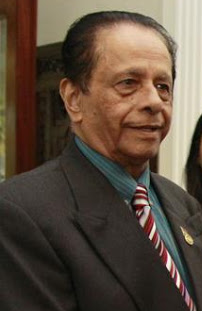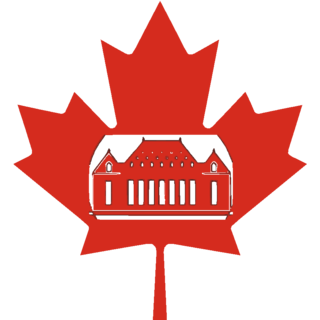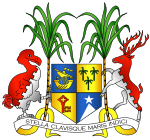
The Judicial Committee of the Privy Council (JCPC) is the highest court of appeal for the Crown Dependencies, the British Overseas Territories, some Commonwealth countries and a few institutions in the United Kingdom. Established on 14 August 1833 to hear appeals formerly heard by the King-in-Council, the Privy Council formerly acted as the court of last resort for the entire British Empire, other than for the United Kingdom itself.

Politics of Mauritius takes place in a framework of a parliamentary democracy. The separation of powers is among the three branches of the Government of Mauritius, namely the legislative, the executive and the Judiciary, is embedded in the Constitution of Mauritius.

Sir Anerood Jugnauth, GCSK, PV, was a Mauritian politician and barrister who served both as President and Prime Minister of Mauritius. He was Member of Parliament for Piton & Riviere Du Rempart. A central figure of Mauritian politics in the 1980s and 1990s, he was Leader of the Opposition from 1976 to 1982. He served as Prime Minister from 1982 to 1995 and again from 2000 to 2003. He was then elected as President of Mauritius and served as such from 2003 to 2012. Following his party's victory in the 2014 general elections, he was appointed again to serve his sixth term as Prime Minister by President Kailash Purryag on 14 December 2014.

The Supreme Court of Ireland is the highest judicial authority in Ireland. It is a court of final appeal and exercises, in conjunction with the Court of Appeal and the High Court, judicial review over Acts of the Oireachtas. The Supreme Court also has appellate jurisdiction to ensure compliance with the Constitution of Ireland by governmental bodies and private citizens. It sits in the Four Courts in Dublin.

The Caribbean Court of Justice is the judicial institution of the Caribbean Community (CARICOM). Established in 2005, it is based in Port of Spain, Trinidad and Tobago.

The Court of Appeal of Singapore is the highest court in the judicial system of Singapore. It is the upper division of the Supreme Court of Singapore, the lower being the High Court. The Court of Appeal consists of the chief justice, who is the president of the Court, and the judges of the Court of Appeal. The chief justice may ask judges of the High Court to sit as members of the Court of Appeal to hear particular cases. The seat of the Court of Appeal is the Supreme Court Building.

The Supreme Court of Canada was founded in 1875 and has served as the final court of appeal in Canada since 1949. Its history may be divided into three general eras. From its inception in 1875 until 1949, the Court served as an intermediate appellate court subject to appeal to the Judicial Committee of the Privy Council in Britain. Following 1949, the Court gained importance and legitimacy as the court of last resort in Canada, establishing a greater role for the Canadian judiciary. In 1982, the introduction of the Canadian Charter of Rights and Freedoms significantly changed the role of the Court in Canadian society, by providing the Court with greater powers of oversight over Parliament and through formal recognition of civil rights including aboriginal rights and equality rights.

A supreme court is the highest court within the hierarchy of courts in most legal jurisdictions. Other descriptions for such courts include court of last resort, apex court, and highcourt of appeal. Broadly speaking, the decisions of a supreme court are not subject to further review by any other court. Supreme courts typically function primarily as appellate courts, hearing appeals from decisions of lower trial courts, or from intermediate-level appellate courts.

The New Zealand Bill of Rights Act 1990 is a statute of the Parliament of New Zealand part of New Zealand's uncodified constitution that sets out the rights and fundamental freedoms of anyone subject to New Zealand law as a bill of rights, and imposes a legal requirement on the attorney-general to provide a report to parliament whenever a bill is inconsistent with the bill of rights.

The Constitution of Belize is the supreme law of the nation of Belize. It was signed on September 1981 with effect from that date.

The Constitution of Kosovo is the supreme law of the Republic of Kosovo. Article four of the constitution establishes the rules and separate powers of the three branches of the government. The unicameral Assembly of the Republic exercises the legislative power, the executive branch led by the President and the Prime Minister which are responsible for implementing laws and the judicial system headed by the Supreme Court.
The law of the Republic of China as applied in Taiwan, Penghu, Kinmen and Matsu is based on civil law with its origins in the modern Japanese and German legal systems. The main body of laws are codified into the Six Codes:

Pravind Kumar Jugnauth is a Mauritian politician serving as the prime minister of Mauritius since January 2017. Jugnauth has been the leader of the Militant Socialist Movement (MSM) party since April 2003. He has held a number of ministerial portfolios and also been Leader of the Opposition.
Ashock Kumar Jugnauth, also known as Ashok Jugnauth is a Mauritian politician and former Member of Parliament.

The Judiciary of Barbados is an independent branch of the Barbadian government, subject only to the Barbadian Constitution. It is headed by the Chief Justice of Barbados. Barbados is a common law jurisdiction, in which precedents from English law and British Commonwealth tradition may be taken into account.

Article 9 of the Constitution of the Republic of Singapore, specifically Article 9(1), guarantees the right to life and the right to personal liberty. The Court of Appeal has called the right to life the most basic of human rights, but has yet to fully define the term in the Constitution. Contrary to the broad position taken in jurisdictions such as Malaysia and the United States, the High Court of Singapore has said that personal liberty only refers to freedom from unlawful incarceration or detention.

The Supreme Court of Nauru was the highest court in the judicial system of the Republic of Nauru till the establishment of the Nauruan Court of Appeal in 2018.

The Constitution of Barbados is the supreme law under which Barbados is governed. The Constitution provides a legal establishment of the Government of Barbados, as well as legal rights and responsibilities of the public and various other government officers. The Constitution which came into force in 1966 was amended in 1974, 1978, 1990, 1992, 1995, 2002, 2003, and 2021. The 1966 document succeeds several other documents concerning administration of Barbados. One of them, the Barbados Charter, is discussed in the present Constitution's Preamble. Prior statutes were created for the administration of Barbados as a colony. As a former English and later British colony, the Constitution is similar to those of other former Commonwealth realms, yet distinctly different in the spirit of the Statute of Westminster.

The Supreme Court of Mauritius is the highest court of Mauritius and is the final court of appeal in the Mauritian judicial system. It was established in its current form in 1850, replacing the Cour d'Appel established in 1808 during the French administration and has a permanent seat in Port Louis. There is a right of appeal from the Supreme Court of Mauritius directly to the Judicial Committee of the Privy Council in London. The Judicial Committee of the Privy Council (JCPC) is the court of final appeal for Mauritius.

The Judiciary of Mauritius is responsible for the administration of justice in Mauritius and has as mission to maintain an independent and competent judicial system which upholds the rule of law, safeguards the rights and freedom of the individual and commands domestic and international confidence. The Constitution provides for the institution of an independent judiciary which is based on the concept of separation of powers. Mauritius has a single-structured judicial system consisting of two parts, the Supreme Court and the Subordinate Courts. The Subordinate Courts consist of the Court of Rodrigues, the Intermediate Court, the Industrial Court, the District Courts, the Bail and Remand Court, the Criminal and Mediation Court and the Commercial Court. The Chief Justice is head of the judiciary. The Constitution of Mauritius is the supreme legal document of the country. The final appeal from decisions of the Court of Appeal of Mauritius to the Judicial Committee of the Privy council in London as provided for under the Constitution of Mauritius.
















